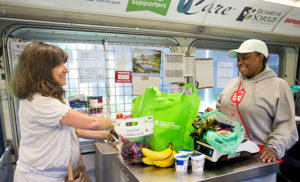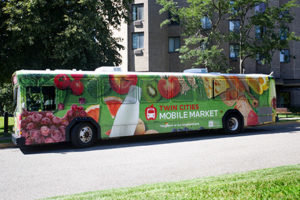By MARGIE O’LOUGHLIN
 Twin Cities Mobile Market’s Keshawn Williams (right) finished a transaction with a Hamline Hi-Rise resident. There are no chips, pop, or junk to be found on the Mobile Market, and customers comment that they appreciate not having the temptation. The easy-to-spot Mobile Market brings healthy food directly into Twin Cities neighborhoods on 33 regularly scheduled routes. (Photos by Margie O’Loughlin)[/caption]
Twin Cities Mobile Market’s Keshawn Williams (right) finished a transaction with a Hamline Hi-Rise resident. There are no chips, pop, or junk to be found on the Mobile Market, and customers comment that they appreciate not having the temptation. The easy-to-spot Mobile Market brings healthy food directly into Twin Cities neighborhoods on 33 regularly scheduled routes. (Photos by Margie O’Loughlin)[/caption] The Midway offers plenty of grocery shopping opportunities, but what if someone is physically unable to get to a grocery store – or just can’t afford the prices?
The residents of Hamline Hi-Rise, a 186 unit St. Paul Public Housing complex located at 777 Hamline Ave. N., are grateful to have another option.
Technically, the residents of the hi-rise live in what has been called a food desert (though the language is changing.) That term has been used to describe urban areas where people are low-income, and live more than one mile from a full-service grocery (or 10 miles from a full-service grocery in rural areas.) Hamline Hi-Rise offers subsidized housing to senior citizens, and is located 12+ blocks from the Midway CUB and Target.
Every Thursday at noon, a retired MTC bus pulls into the Hamline Hi-Rise parking lot and opens its double doors for shoppers. Painted from top to bottom with colorful fruits and vegetables, this grocery store on wheels is called the Twin Cities Mobile Market – and it really gets around.
Leah Porter is the founder and director of the Mobile Market, a social enterprise of the Amherst H. Wilder Foundation. Six years ago, she had just graduated from Hamline University with an MA in non-profit management. Her concentration on food distribution systems had her thinking a lot about how food access could be improved in the Twin Cities.
She thought, “If people are facing barriers such as lack of transportation, affordability, or mobility, why not bring the grocery store to them?”
 Porter talked with hundreds of community members, testing the viability of the grocery store on wheels idea. It was important to her that whatever concept emerged from these discussions be community-driven. She wrote a business plan for the Twin Cities Mobile Market, secured funding for her new non-profit organization, was able to buy a retired MTC bus at a public auction, and oversaw its acquisition by the Wilder Foundation in early 2014.
Porter talked with hundreds of community members, testing the viability of the grocery store on wheels idea. It was important to her that whatever concept emerged from these discussions be community-driven. She wrote a business plan for the Twin Cities Mobile Market, secured funding for her new non-profit organization, was able to buy a retired MTC bus at a public auction, and oversaw its acquisition by the Wilder Foundation in early 2014.
By the end of that year, the first Mobile Market route was launched with 19 stops in St. Paul. A second repurposed bus extended service into Minneapolis in 2017, which brought the total number of stops to 33.
The Hamline Hi-Rise is just one stop on the St. Paul route, but it’s an important one.
Porter said, “We’ve partnered with them from the beginning, ever since their resident council reached out to us. Something unique about the Mobile Market is that where ever we stop, anybody who needs groceries is welcome to come onboard and shop. We don’t check ID or require income verification. We believe there’s a huge gap between food shelves and regular grocery stores. The Mobile Market is filling that gap by bringing healthy, affordable food right into the neighborhoods that need it.”
The Mobile Market stocks more than 200 items in their year-round inventory, and has price points at or below what grocery stores charge. Items for sale include fresh fruits and vegetables, meat, dairy, assorted dry goods, and a limited number of paper products.
To increase affordability, the Mobile Market accepts EBT and participates in a state-funded program called Hunger Solutions. Through that program, for every dollar a customer spends on fresh produce, they receive one Market Buck to spend on fresh produce the next time they visit. In addition to the Market Bucks, anyone who spends $10 with their EBT card at the Mobile Market gets a goodie-bag with free produce donated by Loaves and Fishes. Every first-time customer also receives a free, re-usable tote bag for carrying their groceries home.
Porter said, “We try to provide an excellent value to our customers for their money, as well as friendly, helpful service. We know that many factors contribute to good health – that making positive social connections is very important. For the elderly especially, isolation and loneliness are social determinants that can lead to ill health. We make every effort to get to know our customers, especially the ones who come regularly.”
The Mobile Market has volunteer opportunities for community members interested in leveling the playing field of equitable food distribution. To learn more about volunteering, to check the Mobile Market schedule, or to make a donation toward the cost of food or fuel, visit www.twincitiesmobilemarket.org.
Comments
No comments on this item Please log in to comment by clicking here